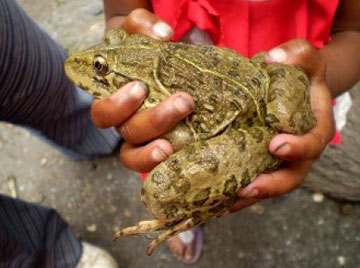|
|
With its famous diversity of frog species, Madagascar has long been targeted by smugglers for the pet trade. While this threat is relatively well understood, less known is the domestic market for edible frogs. Writing in Tropical Conservation Science, researchers from the University of Aberdeen and institutions in Madagascar provide a glimpse into this activity.
Richard Jenkins and Malagasy colleagues conducted a five-month survey of collectors delivering frogs to a restaurant in eastern Madagascar. They found a thriving trade — 3,233 frogs were delivered to the restaurant during the period. Income for collectors selling edible frogs was only slightly lower per edible frog ($0.29) than it was for Mantella milotympanum ($0.32), a critically endangered frog collected for the international pet trade, thus providing an importance source of income for frog hunters. The researchers are now working to determine the sustainability of the industry.
 Hoplobatrachus tigerinus for sale in a market in Antananarivo, the capital city of Madagascar [Photo by R. Rampilimanana /Madagasikara Voakajy] |
“Given the importance to livelihoods of the income generated from edible frogs, it is advantageous to collectors, as well as to conservation biologists and restaurateurs, to protect the remaining forests and amphibian populations,” they write, noting that some collection apparently occurs in conservation areas. “Local communities in these sites are being encouraged to take responsibility for managing the forest in line with the needs of ecosystems, culture, landscape, biodiversity, and livelihoods. The opportunity therefore exists to integrate edible-frog collection as a permitted sustainable activity within certain forest zones.”
The authors conclude by noting that forest degradation — largely due to conversion of agriculture — likely damages frog habitat, thereby potentially impacting collector livelihoods.
Jenkins, K.B. et al 2009. The harvest of endemic amphibians for food in eastern Madagascar. Tropical Conservation Science Vol.2 (1):25-33.